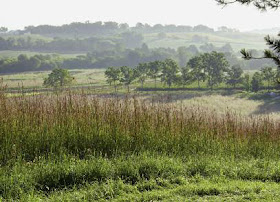Margaret Wilson won the 1924 Pulitzer Prize with her novel The Able McLaughlins, about a Scottish group of families who had transplanted themselves to the Iowa prairie from Scotland and carved farms out of the prairie. When we meet them, their children, born in the United States, are nearing adulthood, the boys who survived just coming home from service for the North in the Civil War.
The story is fairly simple. The young man Wullie McLaughlin comes home wounded from the war and suddenly sees his childhood friend, Chirstie McNair, whom he remembered as a wee lass, in an altogether different light. He intends to marry her and, her behavior conveys, she would agree. He goes back to battlefield, but when he returns at war's end, the girl will have nothing to do with him. The plot revolves around the resolution to this conumdrum.
But the book is called The Able McLaughlins, and the story of Wullie and Chirstie functions as the heightened surfaces of a bas-relief parade of figures and scenes, as Wilson brings to life the type of Scottish community in Iowa into which she was born in 1882. At various points, she suddenly shifts the narrative for a brief second to that of the memoirist writing a tale of her grandparents--like a quick lifting and shutting of a curtain.
Wilson gives this community a voice of its own in the book, but we hear it as if we were in the room with them, sitting at the big table spread with remains of a community meal, as children are ushered into their beds, and the adults are all chewing on the events of the day, seeing if their points of view match, groping in relaxed chatter to a community consensus.
As with Conrad Richter's The Trees, Wilson writes her novel in lyrical imitation of the language of her characters, the talk she must have heard as a child and young girl. The rhythm of the language--moving through descriptions of work and prairie and house, to the inner most thoughts of the characters, to the gatherings and interactions of the wider community--creates a current that keeps the reader swiftly coarsing through the pages, until... much too soon... it's over.


No comments:
Post a Comment